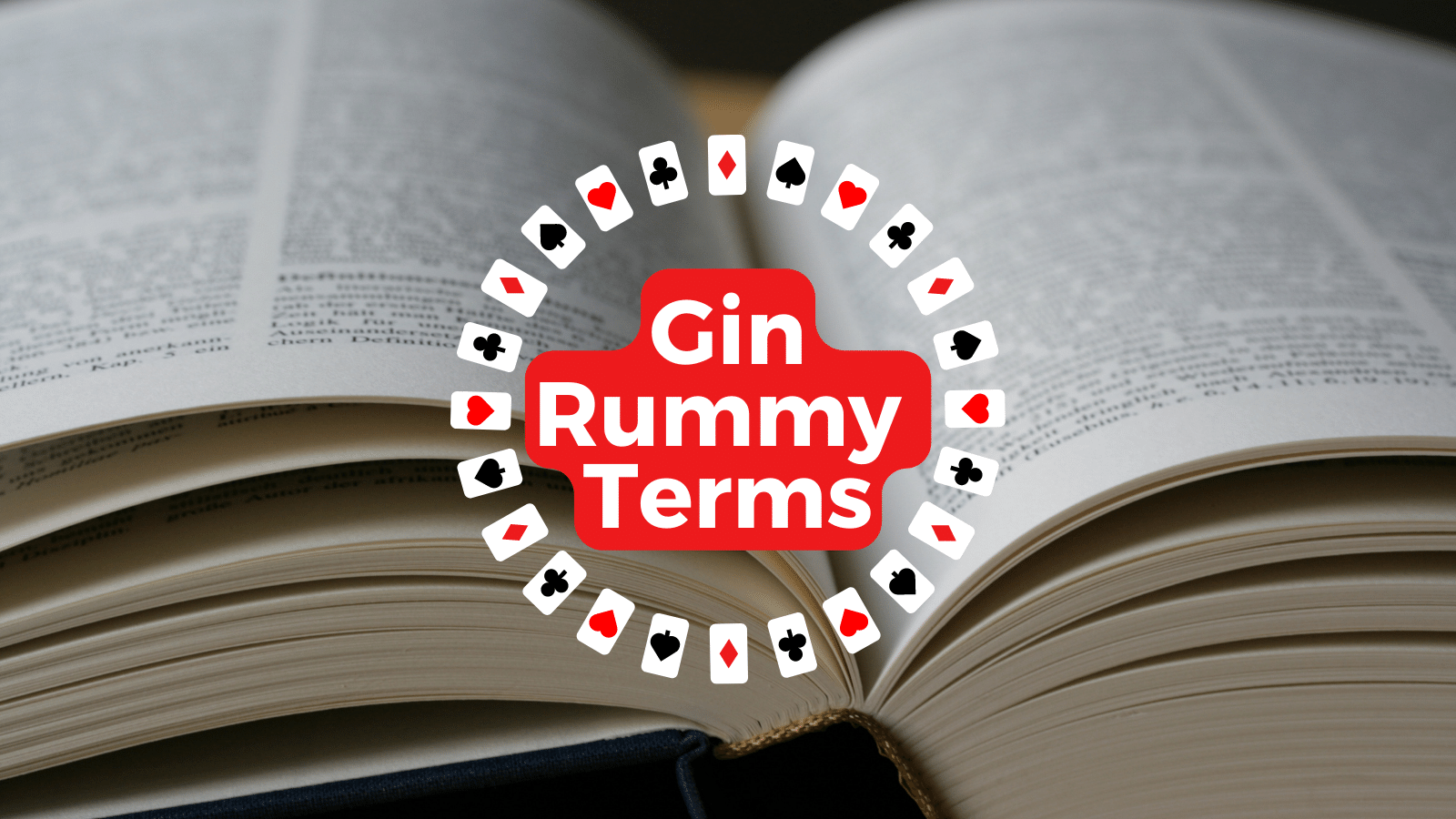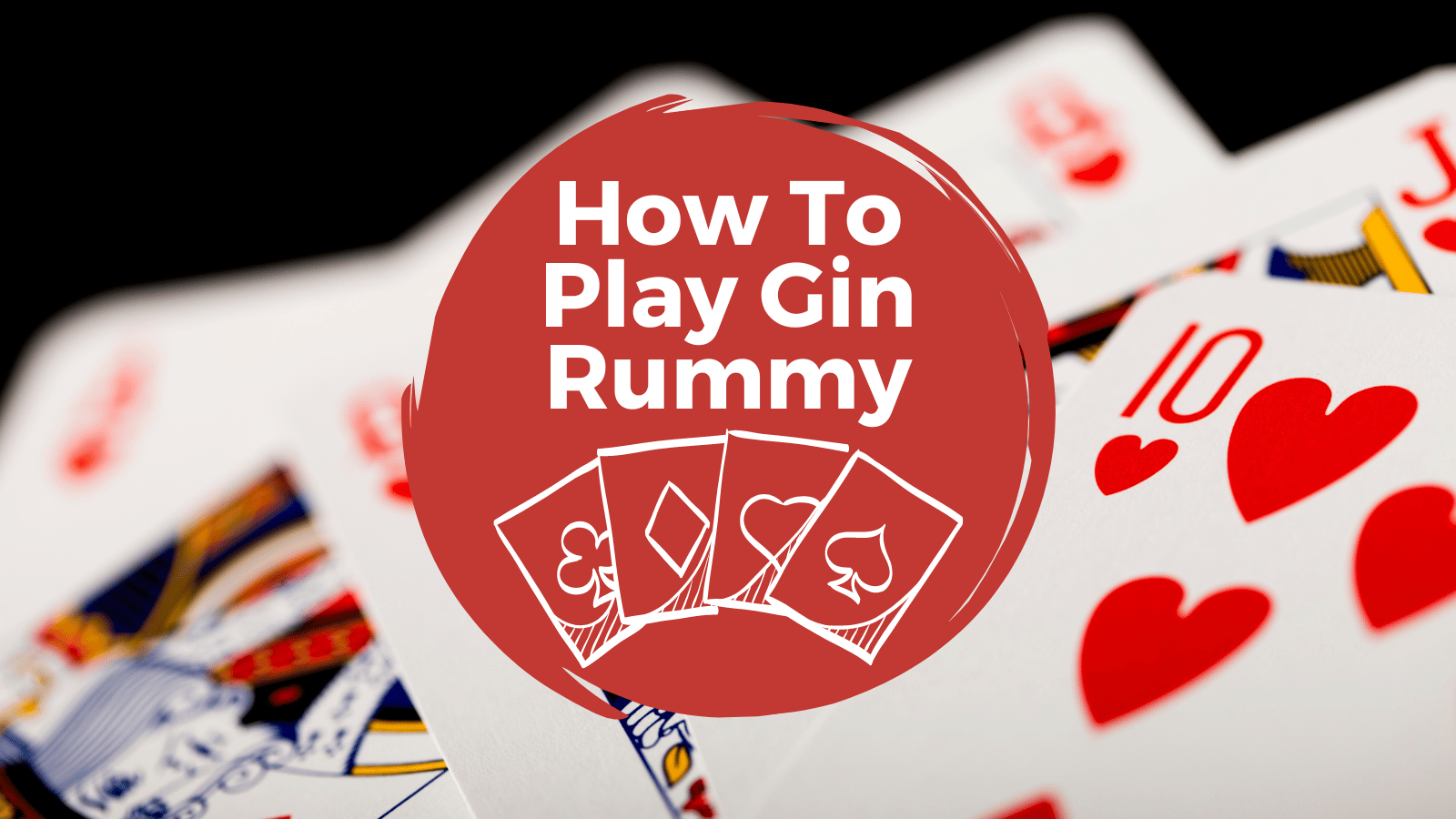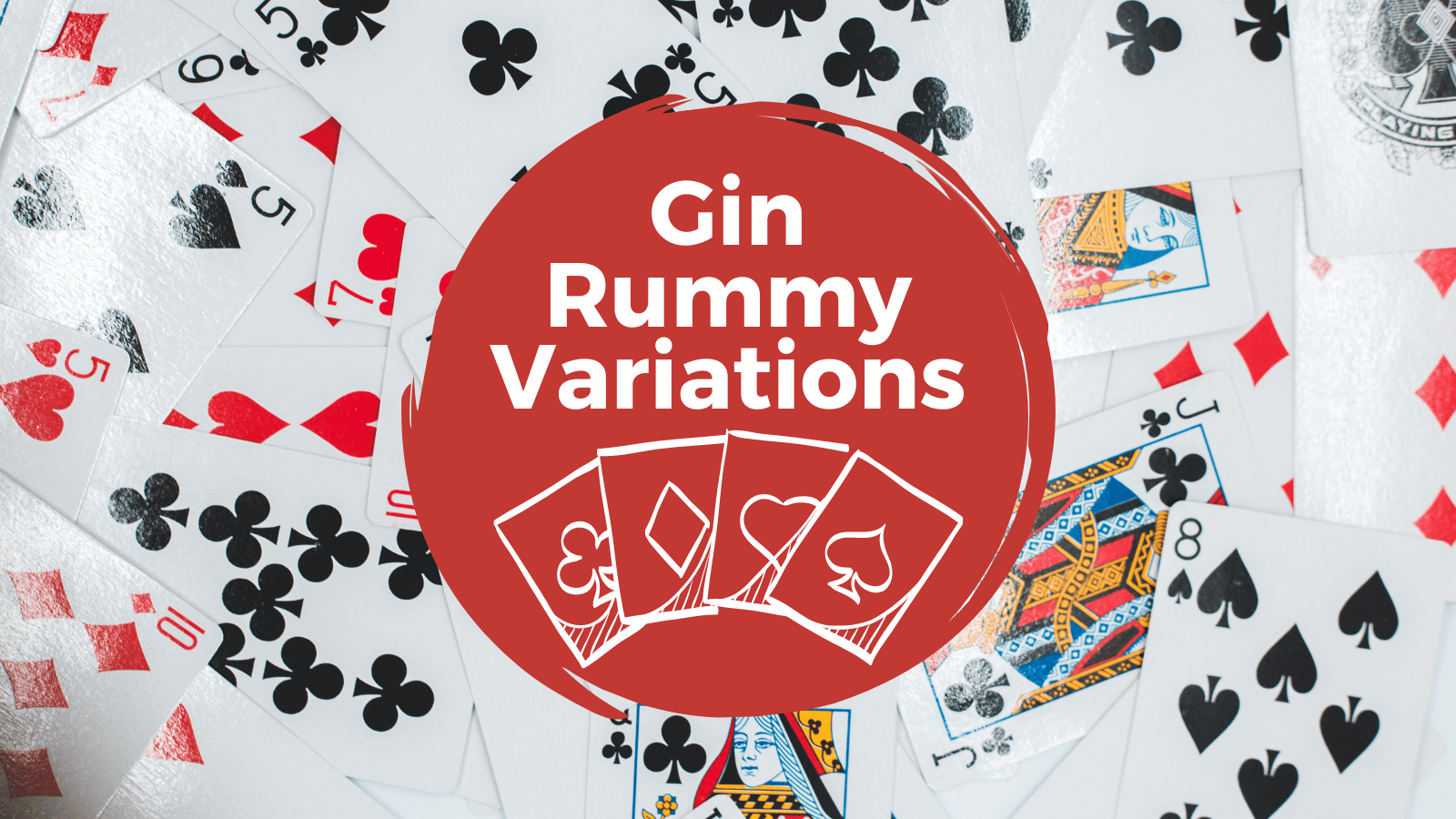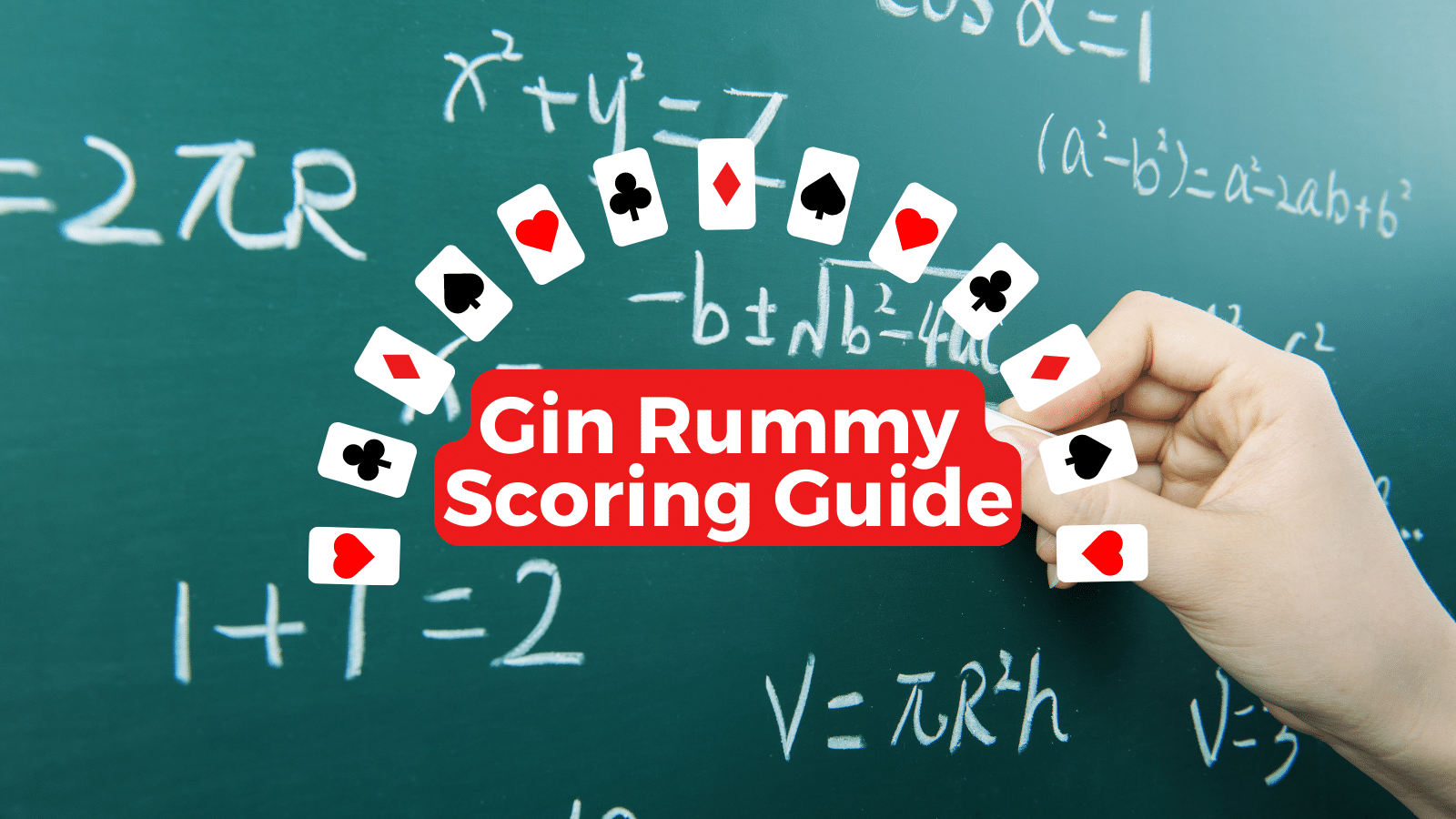Gin Rummy is a heck of a fun two-player game, but if you read about it or play on different apps, there are often terms not everyone will know.
I decided to help you out with this dictionary of Gin Rummy terms you need to know to get the most out of this fun game.
Use the table of contents to jump to the word and see its definition.

Gin Rummy is a great game, but you need the basic rules to get the most out of it.
Check out our complete guide here at the link and improve your 1-on-1 game nights instantly!
Table of Contents
Aces
Aces are the lowest card in Gin Rummy. It’s worth 1 point and typically can’t make runs or straights with the King and Queen.
However, it can make runs with the 2 and 3.
Aces are a solid card to pick up in order to reduce your deadwood, but they aren’t as valuable in making melds because they don’t make runs on the lower end, making them less likely to lay down.
Big Gin
Big Gin is the bonus you get when all 10 of your cards meld AND the card you’ve drawn from the stock or discard piles.
Getting a Big Gin is worth a lot of points. You get all the opponent’s deadwood points AND an extra 31 points.
In some variations of the game, Big Gin may be worth 40 or 50 points instead.
Always be sure to clarify the rules with your opponent beforehand to avoid frustration later on.
Further Reading: Gin Rummy Scoring Guide (With Variations)
Box Bonus
At the end of the game, each gets bonus points for each hand won. This is called the box bonus, hand bonus, or line bonus.
It’s usually 25 points, but I’ve also seen 15 points and 20 points in some versions of the game.
Deadwood
Deadwood is the Gin term for unmatched cards in your hand. Cards that fit into sets (same rank) or runs (sequence of cards of the same suit) are considered matched.
The ones that don’t fit are still counting against you and of no use yet, thus the nickname, “Deadwood.”
Defender
When one player has 10 or fewer deadwood points, they may end the round by knocking. If you are NOT this player, you are the Defender for the round.
If you have fewer deadwood than the Knocker, you get an under cut or under knock bonus.
Discard
On your turn, you must either draw a card blindly from the stock or take one from the discard pile.
This brings you to 11 cards in your hand. To end your turn, you must discard one card face-up into the discard pile.
The exception is all 11 cards meld, in which case you may play a Big Gin which comes with its own bonus.
Discard Pile
This is the face-up pile next to the stock pile. Players get rid of one card every turn into this pile.
Players may choose to take their opponent’s last discard instead of drawing from the stock pile.
Face Cards
Jacks, Queens, and Kings are face cards in Gin Rummy. These are all worth 10 points, along with the 10 card itself.
Kings and Queens cannot connect to the Ace to make a run.
Game Bonus
The first player to reach 100 points gets a 100-point game bonus on top of their score.
This is used for multiple-game matches OR for gambling.
Money is awarded based on how many points you win by.
Gin
When all 10 of your cards meld after the discard, you can play them all and call Gin!
This comes with a bonus.
You get all the deadwood points from your opponent (they still get the chance to lay off first) AND a bonus.
Typically, this is 25 points, but I’ve also seen 20 points as the value used in some versions of the game.
Hand Bonus
At the end of the game, each gets bonus points for each hand won. This is called the box bonus, hand bonus, or line bonus.
It’s usually 25 points, but I’ve also seen 15 points and 20 points in some versions of the game.
Knock
When one player has 10 or fewer deadwood points in their hand, they may choose to knock and end the round.
The player who knocked becomes the Knocker for this hand, and the other is called the Defender.
At this point, both players meld and lay their cards down.
Both players get the chance to lay off their cards on the opponent’s melds.
Deadwood points are now compared. The player with the fewer deadwood points gets to add the difference to their score.
Knocker
The player who knocks is called the Knocker.
Lay Off
After a player knocks or goes Gin, both players meld and lay their cards down. Once the sets and runs are down, players can “lay off” or put down their deadwood cards if they match the opponent’s melds.
Line Bonus
At the end of the game, each gets bonus points for each hand won. This is called the box bonus, hand bonus, or line bonus.
It’s usually 25 points, but I’ve also seen 15 points and 20 points in some versions of the game.
Match
A multiple game series, usually played to a higher amount of points, either 250 or 500.
Game bonuses and line bonuses apply and help the game end quicker (sometimes in a single round).
Match Score
The total score tracked during a match. This may consists of multiple games and is made up of:
- Total deadwood points / knock points (including Gins, under cuts, etc.)
- Game bonus
- Line bonus
Matched Cards
Another word for cards that meld or make up runs and sets. These don’t count against you.
Meld
When you lay your cards down in their sets and runs.
Oklahoma Gin
The most common variation of Gin Rummy and often used in tournament play.
The first card turned over after the deal is the knock value.
Normally, you must have 10 or fewer deadwood to knock.
With this variation, that first card determines the knock value.
If you turn a 6, you must have 6 or fewer deadwood.
If an Ace is turned up, you must have Gin.
Read more: 9 Gin Rummy Variations To Add To Your Game
Pip Value
The value of the cards in terms of counting. Aces are 1, numbered cards are what they are, and all face cards are 10.
Rank
The actual card: Ace, 2, 3, 4, 5, 6, 7, 8, 9, 10, J, Q, K. Not to be confused with pip value.
Runs
Three or more cards in consecutive order. They MUST be the same suit to meld. Aces and Kings cannot connect.
Sets
Groups of three or four cards of the same rank (i.e. 222 or QQQQ) can meld.
Shut Out
When a player reaches 100 points and wins the game without allowing the other player to win a single round.
This is often given an extra 100 point bonus on top of the game bonus and the points to begin with.
In some variations, a shut out bonus instead doubles the value of the line bonus.
Stock / Stock Pile
The cards left over after dealing are placed face down in the center of the playing area. This is the stock pile.
One card is flipped over to start a discard pile at the beginning of the game.
Each turn, players can choose to draw one from the stock or discard piles.
Straights
Another word for runs.
Undercut
When the Defender has fewer deadwood than the Knocker, it’s called under cutting or under knocking.
The Defender gets all the deadwood points AND a bonus!
Usually, this is 25 points, but there are some places where you’ll get 10 or 15 points instead.
Underknock
When the Defender has fewer deadwood than the Knocker, it’s called under cutting or under knocking.
The Defender gets all the deadwood points AND a bonus!
Usually, this is 25 points, but there are some places where you’ll get 10 or 15 points instead.
Unmatched Cards
Another word for deadwood cards. These are cards in your hand that don’t make runs or sets.
Win Balance
Another word for match score.
This may also be used to determine how much money is owed when gambling.






